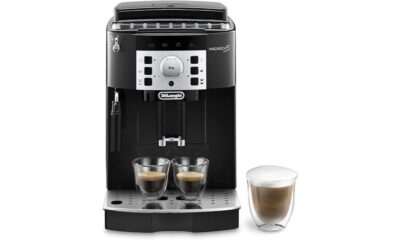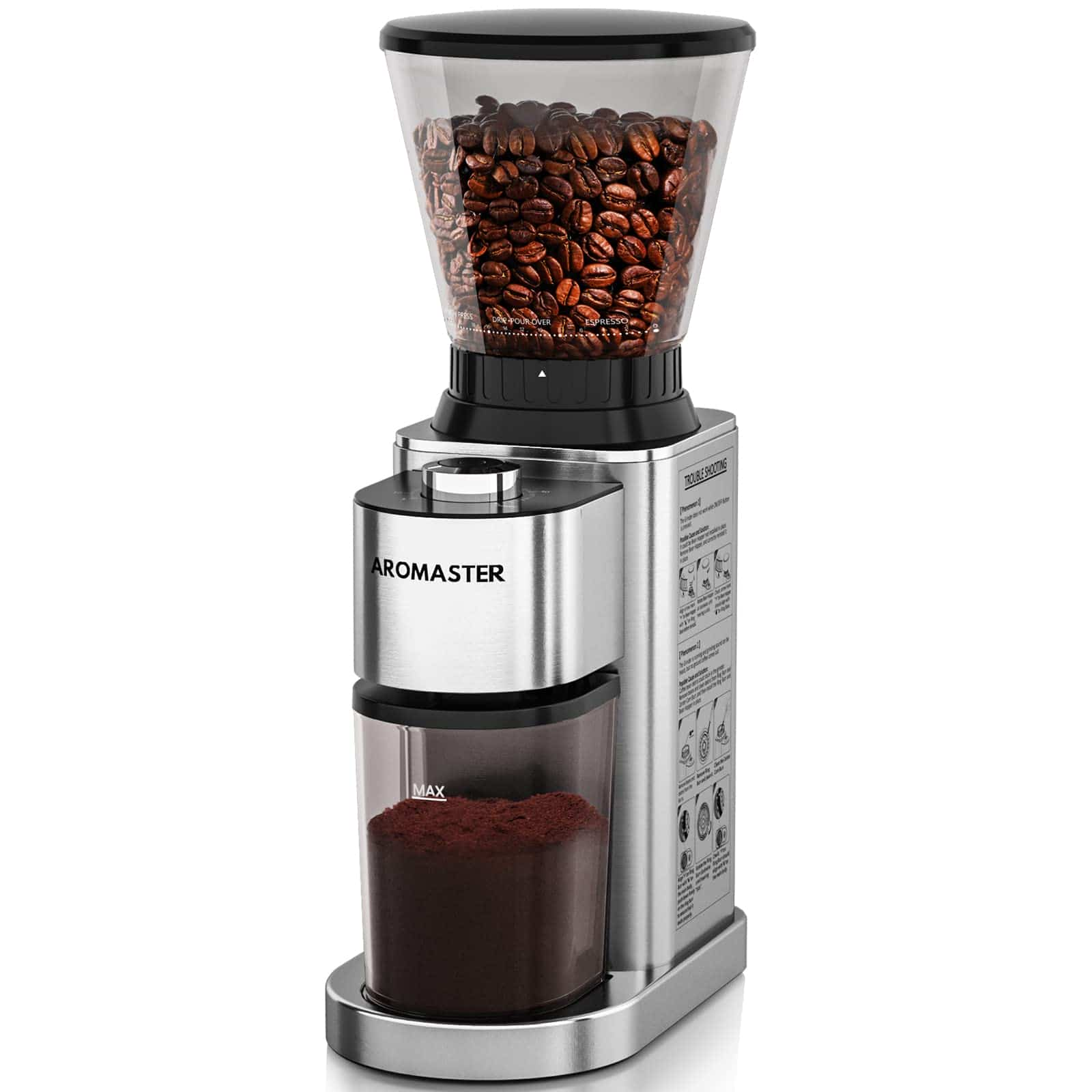Coffee, Tea and Alternatives and Health plus Fitness
The Impact of Coffee on Mental Focus: Research Review
Keen to enhance your mental focus? Discover how coffee can boost your cognitive performance and what the right amount could mean for you.

Coffee's impact on your mental focus is impressive. When you consume about 300 mg of caffeine, you'll notice enhanced alertness, better decision-making, and quicker reaction times. Regular coffee drinkers often report improved cognitive performance and reduced fatigue, especially during demanding tasks. Additionally, caffeine stimulates brain activity, helping with memory retention and recall. While moderate coffee can fuel your productivity, excessive amounts may lead to anxiety or disrupt your sleep. So, if you're curious about how to optimize your coffee consumption for brain health, there's more insight just ahead!
Key Takeaways
- Caffeine enhances mental focus and cognitive function, improving attention and decision-making capabilities in various tasks.
- Moderate coffee intake (300 mg) boosts executive function and reduces mental fatigue, aiding memory retention and recall.
- Regular coffee consumption is linked to lower risks of neurodegenerative diseases, supporting long-term cognitive health.
- Caffeine increases vigilance and reaction times, enhancing workplace productivity and safety in demanding jobs.
- Individual responses to caffeine vary, with genetic and psychological factors influencing its effectiveness on mental focus.
Caffeine Mechanism of Action

Understanding caffeine's mechanism of action reveals why it's so effective at boosting mental focus. Caffeine primarily acts as an antagonist of adenosine receptors in your brain. By blocking the sleep-promoting effects of adenosine, it enhances your wakefulness and alertness. This means that when you consume caffeine, you're effectively fighting off fatigue and staying more engaged.
Moreover, caffeine modulates the release of important neurotransmitters like dopamine and norepinephrine. This modulation not only elevates your mood but also sharpens your cognitive function. Research shows that even low doses of caffeine, around 40 mg, can greatly enhance alertness and attention.
If you increase your intake to moderate doses, approximately 300 mg, you'll notice improvements in vigilance and reaction time.
Caffeine's influence extends to increasing resting brain entropy, which indicates a greater capacity for information processing. In short, it primes your brain for better performance, making it easier to tackle tasks that require focus.
Effects on Cognitive Performance

Caffeine doesn't just enhance alertness; it also greatly impacts cognitive performance. When you consume caffeine, you might notice several improvements in your mental capabilities:
- Enhanced Executive Function: Moderate caffeine consumption, around 300 mg, can boost your ability to make complex decisions, improving judgment and problem-solving skills.
- Improved Memory: Regular intake helps reduce mental fatigue, leading to better retention and recall of information, which is essential in demanding tasks.
- Increased Brain Flexibility: Studies show caffeine can increase resting brain entropy, suggesting that your brain processes information more efficiently, allowing for quicker responses in dynamic environments.
Additionally, coffee drinkers often report better cognitive performance and a lower risk of neurodegenerative disorders over time.
This relationship underscores the potential benefits of caffeine consumption beyond just short-term alertness. As you sip your coffee, remember that these effects could enhance your focus and overall brain function, especially in challenging situations.
Influence on Physical Performance

Many athletes and fitness enthusiasts rely on coffee not just for a mental boost but also for its significant impact on physical performance. Caffeine plays an essential role in enhancing endurance and muscle strength, particularly when you consume doses exceeding 200 mg—about three cups of coffee.
Research shows that caffeine improves time-to-exhaustion, allowing you to push through those last grueling moments of a workout.
In high-intensity sports and team activities, caffeine consumption can lead to better time-trial performance, making it a favorite among competitive athletes. Its ergogenic effects are particularly pronounced in endurance sports, where you can experience significant performance improvements.
Even if you're dealing with sleep loss, caffeine can help offset the degradation of your physical capabilities, ensuring you maintain your performance levels.
Regular caffeine consumption is linked to enhanced physical performance metrics, contributing to better outcomes in demanding physical tasks.
If you want to elevate your workout experience, consider incorporating coffee into your routine. Not only will it enhance your focus, but it'll also give you that extra edge during your physical activities.
Occupational Benefits of Caffeine

In today's fast-paced work environment, caffeine serves as an essential ally for maintaining focus and productivity. With over 80% of U.S. adults consuming caffeine regularly, its occupational benefits are undeniable.
Here's how moderate coffee can enhance your work life:
- Enhanced Mental Focus: Caffeine boosts cognitive function, helping you stay alert and sharp during tasks that require sustained attention.
- Improved Workplace Safety: By increasing vigilance and reaction times, caffeine plays a crucial role in professions like emergency services, where quick decision-making is essential.
- Support Under Sleep Deprivation: If you're in a demanding job, caffeine can mitigate the cognitive decline that often accompanies lack of sleep, enhancing your overall job performance.
Moderate doses around 300 mg can greatly improve your concentration and physical capabilities, making it a valuable tool in physically demanding occupations.
Regular caffeine consumption not only keeps you energized but also contributes to workplace safety, ensuring you perform at your best, even on challenging days.
Active Ingredients in Coffee

Coffee isn't just a pick-me-up; it's packed with active ingredients that contribute to its diverse health benefits. The most notable of these is caffeine, which stimulates your central nervous system. By antagonizing adenosine receptors, caffeine enhances alertness and boosts cognitive function, making it easier for you to stay focused during demanding tasks.
Additionally, coffee contains antioxidants that combat oxidative stress, fresh insights on health benefits which can further support mental clarity and overall well-being.
In addition to caffeine, coffee is rich in chlorogenic acid, a powerful polyphenol antioxidant that aids in blood sugar metabolism and supports cardiovascular health. You'll also find trigonelline, which converts to niacin (vitamin B3) during roasting, adding to coffee's nutritional benefits. Though heat may affect its stability, it's still a valuable compound.
Unfiltered coffee contains cafestol and kahweol, compounds that may positively influence cholesterol levels and liver health.
The antioxidants in coffee play an essential role in combating oxidative stress, which is linked to various neurodegenerative diseases. By promoting brain health, these antioxidants further enhance your cognitive function.
Coffee's Role in Memory

Studies suggest that caffeine can considerably boost your memory, particularly when it comes to recalling learned information after some time has passed.
Research indicates that coffee consumption can have positive effects on both short-term and long-term memory. Here are three key points to evaluate:
- Recognition Memory: Caffeine intake may enhance your ability to recognize material after a delay, suggesting it could aid in memory retention.
- Reduced Forgetting: Some studies link caffeine consumption to a decreased likelihood of forgetting information, hinting at its role in strengthening memories.
- Cognitive Variability: While caffeine shows promise in enhancing certain memory functions, mixed findings exist, highlighting the need for further research to clarify its effects on cognitive processes.
Neurodegenerative Disease Research

Regularly consuming coffee may markedly impact your risk of developing neurodegenerative diseases. Research shows that coffee and caffeine have protective effects, significantly lowering the risk of Alzheimer's disease by up to 65%.
If you enjoy moderate coffee intake, you might also benefit from a 29% reduced risk of Parkinson's disease, highlighting caffeine as the active ingredient responsible for these advantages.
Epidemiological studies suggest that caffeine on the brain provides neuroprotection, potentially reducing the risk of various neurodegenerative disorders. While randomized controlled trials are still needed, the evidence from longitudinal studies is compelling.
Coffee drinkers tend to maintain better brain health over time, showcasing a lower risk of developing dementia.
Moreover, meta-analyses reinforce the protective effect of coffee consumption against stroke, further emphasizing its role in supporting neurological health.
By incorporating coffee into your daily routine, you may not only enhance your mental focus but also contribute positively to your long-term cognitive well-being.
Risks of Excessive Caffeine

While coffee can offer benefits for mental focus and long-term brain health, such as enhancing cognitive function and focus, it's important to recognize the potential risks of excessive caffeine consumption.
High caffeine intake, especially exceeding 400 mg per day, can lead to a range of issues that may undermine your cognitive performance. Here are three significant risks to take into account:
- Anxiety and Restlessness: Excessive caffeine consumption can heighten anxiety levels and cause restlessness, making it harder for you to concentrate. Additionally, incorporating alternatives like mushroom coffee may help reduce stress and promote overall well-being.
- Disrupted Sleep Patterns: High caffeine intake often disrupts sleep patterns, leading to poor sleep quality and increased fatigue, which can further diminish your mental focus.
- Caffeine Withdrawal: If you suddenly cut back on caffeine, you might experience withdrawal symptoms like irritability and headaches, which can negatively impact your overall well-being.
The FDA recommends limiting your daily caffeine intake to about 4-5 cups (400 mg) for healthy adults. Ignoring these guidelines can increase the risk of developing issues that ultimately hinder your mental focus.
Staying aware of your caffeine habits is vital for maintaining both your focus and overall health.
Psychological Impacts of Caffeine

Caffeine, a common stimulant found in coffee, can have profound psychological effects on your well-being. While moderate amounts of coffee might improve your mood and enhance alertness, it's crucial to understand the potential risks.
Habitual coffee drinkers often report higher stress levels compared to non-drinkers, indicating that the effects of caffeine in coffee can vary considerably among individuals. Increased caffeine consumption has been linked to heightened anxiety levels, particularly in males, which raises concerns about the risk of depression for those sensitive to its effects.
Chronic caffeine intake can influence your emotional state and readiness for action, resulting in a positive correlation between the frequency of consumption and stress. Although regular caffeine consumption can boost cognitive performance, it may also exacerbate anxiety and insomnia in susceptible people.
This underscores the importance of moderation. While caffeine can provide benefits, its psychological impacts warrant caution. You might want to monitor your intake carefully to balance the positive effects with the potential risks to your mental health.
Understanding how caffeine affects you personally can help you make informed choices about your coffee consumption.
Future Research Directions

As you consider the future of coffee research, it's essential to look at how individual responses to caffeine can differ markedly.
Understanding the long-term effects of chronic coffee consumption on mental focus could reveal insights about stress and anxiety.
Individual Response Variability
Understanding individual response variability to coffee is essential for optimizing mental focus and cognitive performance. Your unique reaction to caffeine results from several factors, including genetic differences in caffeine metabolism and psychological factors.
Here are three key areas that highlight this variability:
- Caffeine Metabolism: Your body processes caffeine differently due to genetic traits, impacting its effectiveness and side effects.
- Habitual Caffeine Consumers: If you regularly consume caffeine, you might notice diminished sensitivity, requiring higher doses for similar cognitive benefits compared to non-consumers.
- Psychological Factors: Your anxiety levels and stress can influence how caffeine affects you; sensitive individuals may experience heightened anxiety with increased intake.
This variability suggests that personalized recommendations could be significant for enhancing cognitive performance based on your health profile and consumption habits.
Future research should focus on how lifestyle factors, like diet and exercise, interact with caffeine intake to affect individual responses. By understanding these dynamics, you can better tailor your coffee consumption to optimize mental focus in various contexts.
Chronic Consumption Effects
While individual responses to caffeine vary, chronic coffee consumption raises important questions about its long-term effects on mental focus and cognitive performance.
Future research should investigate how habitual coffee intake influences brain connectivity and whether these changes enhance or impair cognitive processing. Understanding individual variations in caffeine responses based on consumption habits is essential; what works for one person may not work for another, affecting overall mental focus and cognitive health.
Additionally, it's important to explore how chronic caffeine consumption intersects with emotional regulation and stress levels.
Stress can greatly impact your mental focus, so examining this relationship could reveal more about coffee's role in your daily cognitive functioning.
Frequently Asked Questions
Does Caffeine Increase Mental Focus?
Yes, caffeine can increase your mental focus. It enhances alertness, attention, and cognitive performance by blocking adenosine receptors, which helps you stay sharp and sustain focus, especially during demanding tasks or complex decision-making.
Does Coffee Affect You Mentally?
Yes, coffee affects you mentally. It boosts alertness, enhances cognitive performance, and can improve your mood. Regular consumption may also sharpen your focus and help reduce mental fatigue, especially during demanding tasks or long work hours.
Does Coffee Help With Focus and Concentration?
Yes, coffee can help with focus and concentration. When you drink it, caffeine blocks adenosine receptors, boosting alertness and cognitive performance. This makes it easier for you to stay attentive during tasks that require mental effort.
Is Coffee Good or Bad for the Brain?
Coffee's effects on your brain can be positive or negative. Moderate consumption boosts alertness and mood, while excessive intake may cause anxiety and disrupt sleep. It is crucial to find a balance that works best for you.
Conclusion
So, there you have it! Caffeine's your trusty sidekick, boosting focus like a superhero on espresso. Just remember, while it can turn you into a productivity machine, overdoing it might have you jittering like a squirrel on a sugar rush. And hey, if you're aiming for a PhD in "Why Can't I Sleep?" coffee's got your back. Just don't forget, moderation is key—unless you're trying to perfect the art of hyperactive procrastination! Cheers to caffeinated brilliance!
In the vast and diverse world of coffee, coffee alternatives, and tea, Olivia has found her calling. As an author and a dedicated coffee and tea aficionado, her work for Cappuccino Oracle reflects her profound love and understanding of the intricate complexities found within these beverages. Olivia’s passion for the subject serves as both a catalyst for her creativity and a connection point with her audience.
Olivia’s appreciation for coffee, coffee alternatives, and tea blossomed at an early age. She discovered that these beverages invigorated her senses and stimulated her creative spirit. From the nuanced flavors of single-origin roasts to the captivating narratives intertwined with coffee, coffee alternatives, and tea trade and culture, Olivia found an unlimited source of inspiration in her daily cup.
Her love for these beverages and her talent for storytelling eventually converged at Cappuccino Oracle. As an author, Olivia’s mission is to illuminate the intricate tapestry that makes up the world of coffee, coffee alternatives, and tea. Her articles span a diverse range of topics, encompassing everything from the unique flavors of different brews to the sociocultural history intertwined with their cultivation and consumption.
Coffee, Tea and Alternatives and Health plus Fitness
Male Fertility and Coffee Consumption
Keen to understand how your coffee habits influence male fertility? Discover the surprising effects of caffeine on sperm quality and reproductive health.

Your coffee consumption can directly impact your male fertility. Studies show that moderate intake, about 1-2 cups a day, is generally safe and might even improve sperm motility. However, exceeding this amount can lower IVF success rates and negatively affect sperm quality, including motility and count. Excessive caffeine, particularly from sugary sodas, may disrupt hormonal levels and lead to reproductive health issues. To support your fertility, aim for a moderate caffeine intake of 2-3 cups daily. There's more to explore about the connections between lifestyle choices and fertility health that could be beneficial for you.
Key Takeaways
- Moderate coffee consumption (1-2 cups/day) is safe and may even improve sperm motility, supporting male fertility.
- Excessive coffee intake (2+ cups/day) is linked to decreased IVF success rates and impaired sperm quality.
- High caffeine intake can disrupt hormonal balance, potentially lowering testosterone and increasing estrogen levels in men.
- Sugar-laden beverages, especially cola, negatively impact sperm health and can trigger hormonal imbalances affecting fertility.
- Health professionals recommend limiting caffeine to 2-3 cups daily to support reproductive health and fertility.
Overview of Male Fertility

Understanding male fertility is essential for those looking to conceive. Approximately 7% of men globally face male infertility, which often stems from low sperm count, poor sperm motility, and abnormal sperm morphology.
If you're trying to conceive, it's vital to recognize how your lifestyle choices impact your reproductive health.
Diet plays a significant role; research shows that non-cola drinkers have an average sperm concentration of 56 million/mL, while high cola drinkers average only 40 million/mL. This suggests that what you consume can directly affect your sperm health.
Exercise is equally important, as maintaining a healthy weight can improve your overall fertility outcomes.
Moreover, environmental factors and exposure to toxins can further exacerbate the risk of male infertility. Unhealthy habits, such as smoking or excessive alcohol consumption, can also diminish your chances of conceiving.
Taking a holistic approach to your reproductive health means addressing these lifestyle choices and making positive changes. By understanding these aspects of male fertility, you can take proactive steps toward enhancing your chances of conception and addressing any potential male infertility issues.
Coffee Consumption and Caffeine

When it comes to coffee and fertility, caffeine plays an essential role that you need to take into account.
Excessive intake, especially beyond two cups a day, can lower your chances of successful IVF and may negatively affect sperm quality.
On the other hand, moderate consumption mightn't have a significant impact, so finding the right balance is key.
Caffeine's Impact on Fertility
Frequent coffee consumption can play a significant role in male fertility, with research showing varying effects based on the amount consumed. High caffeine intake, particularly from caffeinated sodas and energy drinks, can negatively impact sperm quality, leading to decreased motility and volume.
If you consume more than two cups of coffee daily, you might find that your chances of successful IVF pregnancies drop below 20%. On the other hand, those who limit their intake to less than one cup daily enjoy over a 50% success rate.
Interestingly, some studies suggest that moderate coffee consumption—about one to two cups per day—may not adversely affect male fertility. In fact, a Brazilian study found a correlation between higher coffee consumption and improved sperm motility, indicating potential benefits from moderate intake.
However, be cautious of the sugar content in caffeinated beverages like cola, as excess sugar has been linked to decreased sperm count and function.
Ultimately, while caffeine affects male fertility, the key lies in finding a balance that works for you. Moderation appears to be the safest approach when it comes to coffee and fertility.
Recommended Coffee Intake Levels
To promote ideal male fertility, it's essential to be mindful of your coffee intake. Research suggests that moderate coffee consumption—typically defined as 1-2 cups daily—can be safe for maintaining reproductive health. Each cup of coffee contains about 96 mg of caffeine, placing your caffeine intake well within the recommended coffee intake levels when you stick to this guideline.
Studies show that a low (101-200 mg) to moderate (201-800 mg) caffeine intake doesn't negatively affect semen quality. This means you can enjoy your daily cups without worrying too much about impairing your fertility.
However, if you consume more than 2 cups a day, you might face potential risks. Excessive coffee consumption has been linked to lower success rates in assisted reproductive technologies like IVF, as well as impaired sperm quality and motility.
Health professionals generally recommend limiting your caffeine intake to 2-3 cups per day to avoid any negative impacts on your reproductive health. By keeping your consumption within these recommended levels, you'll be taking a proactive step toward supporting your fertility.
Study Findings on Semen Quality

When it comes to caffeine's impact on sperm quality, research shows mixed results.
While moderate coffee consumption seems safe, high cola intake might negatively affect sperm concentration.
It's important to evaluate consumption guidelines and the limitations of available studies as you assess your own habits.
Caffeine's Impact on Sperm
Numerous studies have explored caffeine's impact on sperm health, revealing a complex relationship between consumption levels and semen quality. For instance, a significant study of 2,554 young Danish men found that high cola consumption—more than 14 half-liter bottles a week—led to reduced sperm concentration and total sperm count. This suggests that cola's unique ingredients might negatively affect sperm independent of caffeine intake.
When it comes to moderate caffeine intake, researchers observed no significant effects on semen quality. Low intake, defined as less than 100 mg per day, also showed no correlation with reduced sperm parameters. Notably, non-cola drinkers had higher sperm concentrations compared to those who consumed high amounts of cola, emphasizing the potential risks associated with cola drinks.
However, some studies indicated that excessive coffee consumption could lower IVF success rates. Men drinking two or more cups daily had less than a 20% chance of pregnancy, while those consuming under one cup daily boasted over a 50% success rate.
Coffee Consumption Guidelines
Excessive coffee consumption can greatly impact male fertility, particularly for those undergoing IVF treatments. Studies show that drinking two or more cups daily may reduce your chances of pregnancy to less than 20%, compared to over 50% for those who consume less than one cup daily.
To adhere to effective coffee consumption guidelines for fertility, aim for moderate intake of about 1-2 cups daily. This amount, which translates to roughly 96 mg of caffeine per cup, is generally considered safe and unlikely to harm semen quality.
However, it's essential to remain cautious about high caffeine intake, as some research indicates it could lead to decreased sperm quality and motility. This suggests that there's a potential threshold effect, where moderation becomes critical for maintaining reproductive health.
Additionally, consider the sugar in caffeinated soft drinks, which may further complicate the effects on sperm health. Ultimately, while moderate coffee consumption might've neutral effects, excessive intake could pose risks.
Keep these guidelines in mind to support your fertility journey effectively.
Research Limitations and Variability
Research on how coffee consumption affects semen quality presents a complex picture. You might find that studies yield mixed results, with some indicating that excessive coffee intake can impair male fertility by reducing sperm quality and motility.
For instance, a notable study at the ASRM annual conference revealed that men who consumed two or more cups daily had less than a 20% chance of achieving pregnancy through IVF, compared to over 50% for those drinking less than one cup.
While moderate coffee consumption appears to have neutral effects, high caffeine intake may lead to diminished semen volume and sperm count.
Additionally, a 2010 study pointed out that cola drinkers showed decreased semen volume and sperm count, suggesting that the combination of sugar and caffeine in soft drinks could uniquely impact male reproductive health.
These findings highlight significant research limitations, as the variability in results often stems from differing methodologies, sample sizes, and individual lifestyle factors.
Because of this, further research is essential to clarify the complex relationship between coffee consumption, caffeine levels, and male fertility outcomes. Understanding these nuances can help you make informed choices about your coffee habits.
High Coffee Intake Risks

When it comes to male fertility, high coffee intake can pose significant risks. If you're consuming two or more cups daily, your chance of achieving pregnancy through IVF drops to less than 20%, compared to over 50% for those drinking less than one cup. This stark difference highlights the potential impact of your coffee habit on sperm quality.
Studies show that excessive coffee consumption is linked to decreased sperm motility and abnormal morphology, which can hinder your chances of conception. Additionally, a 2010 study found that cola drinkers, often consuming caffeine, exhibited reduced semen volume and sperm count. This suggests that caffeine might be affecting not just your sperm count but also the overall health of your sperm.
Moreover, high caffeine intake can disrupt hormonal levels in men, further complicating fertility issues. To mitigate these potential risks, consider limiting your coffee consumption to 2-3 cups per day.
Lifestyle Factors Affecting Fertility

While many factors contribute to male fertility, lifestyle choices play an essential role in determining sperm quality and overall reproductive health. Unhealthy lifestyle habits can greatly impact your fertility, leading to lower sperm counts and decreased semen quality.
For instance, excessive caffeine intake—particularly from soft drinks—has been linked to reduced semen volume and sperm count. If you're consuming more than two cups of coffee daily, you might be jeopardizing your chances of conception, especially if you're considering IVF. Incorporating regular physical activity and prioritizing a balanced diet rich in fruits, vegetables, and whole grains can further enhance your reproductive health.
Moreover, heavy alcohol consumption can impair sperm quality and increase the risk of miscarriage, so moderation is essential. Smoking also poses a considerable risk, affecting both sperm health and overall reproductive viability.
On the flip side, adopting healthier lifestyle habits can support your fertility. Regular exercise and a balanced diet can counteract some adverse effects of poor choices, helping you maintain ideal reproductive health.
If you're planning for a family, taking control of your lifestyle habits is essential. By making small, positive changes, you can greatly improve your chances of successful conception.
Caffeine's Impact on Hormones

Caffeine can disrupt your hormonal balance, particularly affecting testosterone levels, which is essential for fertility.
If you consume more than two cups of coffee a day, you might notice variations in these hormone levels, potentially impacting sperm production.
Understanding how caffeine influences hormones like estrogen is important for maintaining reproductive health.
Hormonal Balance Disruption
Altering hormone levels through high caffeine intake can greatly impact male fertility. When you consume excessive caffeine, particularly from coffee, you may disrupt your hormonal balance, which is critical for reproductive health.
Research shows that high caffeine intake could lower luteinizing hormone (LH) levels, significant for regulating testosterone production. This disruption can interfere with the hypothalamic-pituitary-gonadal axis, ultimately affecting the hormonal signals necessary for sperm production.
Moreover, caffeine may lead to increased estrogen levels in men, contributing further to hormonal imbalances that can hinder fertility. The relationship between caffeine and hormone levels isn't the same for everyone; individual responses can vary widely.
It's important to reflect on how your unique body reacts to caffeine when evaluating its impact on your reproductive health. As you think about your coffee consumption, keep in mind that maintaining a healthy hormonal balance is crucial for ideal fertility.
If you're concerned about how caffeine might be affecting your hormonal levels, a personalized evaluation could provide insights tailored to your specific situation. Balancing coffee intake with awareness of its potential effects on hormones can be a wise step towards supporting your fertility.
Testosterone Levels Variation
Maintaining a hormonal balance is key to your reproductive health, and testosterone levels play a vital role in this equation. You mightn't realize that your coffee consumption can considerably impact testosterone levels variation.
Studies indicate that high caffeine intake may lead to fluctuations in testosterone, and excessive consumption—like drinking more than three cups daily—could actually lower your testosterone levels.
In contrast, moderate caffeine intake, around 200-400 mg per day, seems to maintain stable testosterone levels for many men. This suggests a potential threshold effect, where too much caffeine might disrupt your hormonal balance.
While caffeine may give a temporary boost to testosterone, chronic high intake can lead to long-term hormonal imbalances.
The relationship between caffeine and testosterone is complex, and it's important to remember that individual responses can vary based on factors like genetics and overall health.
Estrogen Influence on Fertility
Understanding how various substances affect your hormone levels is vital for fertility, especially regarding estrogen's role. Caffeine, often enjoyed in your daily cup of coffee, can have surprising effects on your hormonal balance. Some studies suggest that high caffeine intake might lead to decreased estrogen levels in men, which can greatly impact sperm production and overall fertility.
Caffeine's Impact on Estrogen and Fertility
| Hormonal Effect | Potential Consequence | Emotional Impact |
|---|---|---|
| Decreased Estrogen | Lower sperm production | Anxiety about fatherhood |
| Hormonal Fluctuations | Disrupted reproductive health | Frustration in relationships |
| Imbalanced Hormones | Reduced fertility outcomes | Hopelessness in trying to conceive |
| Lower Sperm Quality | Compromised reproductive potential | Fear of infertility |
| Decreased Motility | Challenges in conception | Stress about future family |
Excessive coffee consumption can lead to hormonal disruptions that interfere with the normal reproductive hormone axis in men. With caffeine's potential to alter testosterone levels and decrease estrogen, understanding its impact on your fertility is vital. Prioritizing a balanced lifestyle may help support your reproductive health and improve your chances of conception.
The Role of Sugar in Beverages

Sugar plays a significant role in the beverages we consume daily, especially when it comes to soft drinks and energy drinks. These sugary drinks are major sources of added sugars in the U.S., and their consumption can negatively affect sperm quality. Excessive sugar intake has been linked to various metabolic issues, which may further worsen fertility problems in men.
The combination of caffeine and sugar found in cola drinks can have a compounding negative effect on sperm health. Both components can impact reproductive outcomes, leading to concerns about their long-term effects.
Studies suggest that high sugar intake can trigger hormonal imbalances, potentially affecting testosterone levels and overall reproductive health in males.
Understanding the role of sugar in caffeinated beverages is essential for evaluating their overall impact on male fertility. You might want to think about moderating your consumption of these drinks to help maintain ideal sperm quality.
As you navigate your dietary choices, keep in mind that reducing sugar intake could benefit not just your general health but also your reproductive health. Balancing your beverage choices can play a significant role in supporting your fertility goals.
Recommendations for Healthy Intake

When it comes to coffee consumption and male fertility, striking a balance is key. You should limit your intake to 2-3 cups of coffee per day. Excessive coffee consumption may impair male fertility and reduce the chances of successful IVF outcomes.
While moderate caffeine intake, ranging from 101-800 mg per day, hasn't been considerably linked to reduced semen quality, it's wise to err on the side of caution. The average cup of coffee contains about 96 mg of caffeine, so sticking to 1-2 cups daily is generally considered safe for maintaining ideal fertility.
In addition to monitoring your caffeine intake, pay attention to the sugar content in your caffeinated beverages. High sugar consumption can negatively impact sperm count and function, potentially exacerbating any effects from caffeine.
Always remember to consult with your healthcare provider regarding your caffeine and dietary habits, especially if you're concerned about fertility. Following these recommendations for healthy intake can help you enjoy your coffee while supporting your reproductive health.
Balancing your coffee consumption with a mindful approach could make a difference for your fertility journey.
Alternative Perspectives on Caffeine

While many studies highlight the potential risks of high caffeine intake on male fertility, there are also alternative perspectives worth considering.
Research shows mixed evidence regarding caffeine's impact on sperm quality. While some studies link excessive coffee consumption—over two cups daily—to reduced sperm motility and lower sperm count, others suggest that moderate caffeine intake mightn't harm fertility and could even enhance sperm motility in certain cases. This indicates that not all caffeine consumption is detrimental.
Moreover, the influence of sugar in caffeinated beverages, especially colas, complicates the evaluation of caffeine's effects. Excessive sugar intake has its own negative implications for male fertility, which could skew the results regarding caffeine. As a result, it's essential to separate the effects of caffeine from those of added sugars.
Given these nuances, moderation seems to be the key. Guidelines suggest limiting caffeine intake to 2-3 cups per day for ideal fertility outcomes.
This balanced approach allows you to enjoy coffee while remaining mindful of your reproductive health. Ultimately, considering these alternative perspectives on caffeine can provide a more thorough understanding of its role in male fertility.
Understanding Male Infertility Causes

Understanding the causes of male infertility is essential for addressing reproductive health concerns effectively. Male infertility affects about 7% of men globally, with common contributors being low sperm count, poor sperm motility, and abnormal sperm morphology.
Your lifestyle choices play a notable role in your reproductive health. Unhealthy diets, lack of exercise, and substance use can adversely affect sperm quality.
Additionally, physical problems, hormonal imbalances, and advanced paternal age can contribute to infertility. As you age, sperm quality tends to decline, making it important to evaluate age-related factors during assessments.
Environmental toxins and occupational hazards are also significant contributors, so being aware of your surroundings is crucial.
To develop effective treatment plans, a thorough evaluation that includes your lifestyle factors—like caffeine and sugar intake—is necessary.
Frequently Asked Questions
Does Coffee Affect Fertility in Males?
You might wonder if coffee affects fertility in males. Research shows mixed results; excessive coffee consumption could lead to decreased sperm quality and motility.
However, moderate intake—around one to two cups daily—seems safe and mightn't greatly impact semen quality.
It's crucial to stay informed, as ongoing studies continue to explore this topic. Ultimately, balancing your coffee habits while considering overall health is a smart approach to take.
Should Men Stop Drinking Coffee When Trying to Conceive?
Life's a balancing act, and coffee can tip the scales.
If you're trying to conceive, it might be wise to reconsider your coffee habit. While enjoying a cup occasionally won't likely hurt, high consumption could lower your chances.
Moderation is key; limit yourself to one cup daily or less. By doing so, you'll not only promote better reproductive health but also keep the joy of that morning ritual intact.
Is Caffeine or Alcohol Worse for Sperm?
When considering caffeine and alcohol, you might find alcohol to be the more significant concern for sperm health.
Heavy drinking can lead to decreased libido and compromised sperm quality, making it a bigger risk.
While caffeine can have mixed effects, moderate coffee intake isn't usually harmful.
However, if you're consuming excessive caffeine, it could still impact your overall health.
Prioritize moderation in both to support your well-being and fertility.
Are Energy Drinks Bad for Male Fertility?
Like a double-edged sword, energy drinks can cut both ways for your health.
When it comes to male fertility, these drinks aren't doing you any favors. High caffeine and sugar levels might lead to decreased sperm quality, affecting your reproductive health.
Studies suggest that regular consumption could reduce sperm count and motility.
Conclusion
In traversing the complex world of male fertility, think of your body as a finely tuned orchestra. Just as a single off-key note can disrupt harmony, high coffee consumption may impact your semen quality. Research shows that excessive caffeine can be detrimental, yet moderation is key. By balancing your coffee intake and considering lifestyle factors, you can create a symphony of health that supports your fertility journey. So, savor your coffee, but remember to keep the rhythm in check.
In the vast and diverse world of coffee, coffee alternatives, and tea, Olivia has found her calling. As an author and a dedicated coffee and tea aficionado, her work for Cappuccino Oracle reflects her profound love and understanding of the intricate complexities found within these beverages. Olivia’s passion for the subject serves as both a catalyst for her creativity and a connection point with her audience.
Olivia’s appreciation for coffee, coffee alternatives, and tea blossomed at an early age. She discovered that these beverages invigorated her senses and stimulated her creative spirit. From the nuanced flavors of single-origin roasts to the captivating narratives intertwined with coffee, coffee alternatives, and tea trade and culture, Olivia found an unlimited source of inspiration in her daily cup.
Her love for these beverages and her talent for storytelling eventually converged at Cappuccino Oracle. As an author, Olivia’s mission is to illuminate the intricate tapestry that makes up the world of coffee, coffee alternatives, and tea. Her articles span a diverse range of topics, encompassing everything from the unique flavors of different brews to the sociocultural history intertwined with their cultivation and consumption.
Coffee, Tea and Alternatives and Health plus Fitness
Coffee’s Impact on Female Fertility
In exploring coffee’s impact on female fertility, you’ll discover surprising insights that could influence your conception journey. What might you be overlooking?

Coffee's impact on female fertility mainly hinges on caffeine intake. High caffeine levels can delay conception and increase the risk of miscarriage. If you're trying to conceive, it's best to stick to a limit of around 200mg per day, roughly two cups of coffee. Curiously, moderate coffee consumption may support higher pregnancy rates, especially for those undergoing treatments like IUI. Keep in mind that caffeine can affect hormonal balance and egg quality. Want to understand more about how to balance your coffee habits for better reproductive health? There's plenty more to uncover.
Key Takeaways
- High caffeine intake, particularly from coffee, may increase the risk of miscarriage and prolong time to conception in women.
- Moderate coffee consumption (up to 200mg/day) may not adversely affect fertility and could be linked to higher pregnancy rates during IUI.
- Each additional cup of tea consumed is associated with a 27% decrease in infertility risk for women.
- Caffeine can influence egg quality and hormonal balance, potentially impacting female reproductive health.
- Monitoring all caffeine sources, including coffee, tea, and energy drinks, is crucial for managing intake while trying to conceive.
Understanding Caffeine and Its Sources

Caffeine, a common stimulant found in coffee, tea, and various other beverages, plays a significant role in your daily routine.
It's important to understand the sources of caffeine and how they can impact your health, particularly if you're a woman trying to conceive or pregnant. Additionally, certain herbal alternatives, like natural alternatives to synthetic botox, can be beneficial for overall wellness during this time.
The average cup of coffee contains about 85mg of caffeine, but this can vary based on preparation and bean type. While enjoying your morning brew or that afternoon tea, it's essential to monitor your total caffeine consumption.
For women aiming for fertility or who are pregnant, the recommended daily caffeine limit is around 200mg, roughly equivalent to two cups of coffee. High caffeine intake may lead to risks like prolonged time to conception and increased miscarriage rates.
Although definitive proof linking caffeine directly to fertility issues is inconclusive, the potential health risks remain a concern.
Caffeine easily crosses the placenta, and pregnant women may metabolize it more slowly, heightening sensitivity to its effects.
Caffeine's Effects on Male Fertility

When it comes to male fertility, the impact of caffeine has sparked substantial interest among researchers and health professionals. You've probably heard that caffeine consumption can play a role in reproductive health, but the specifics are still being explored.
Some studies indicate that high caffeine consumption may negatively affect sperm quality, though the relationship between caffeine and male fertility isn't entirely clear.
Lifestyle factors, including your caffeine intake, can greatly influence your overall reproductive performance and fertility outcomes. While moderate caffeine consumption typically doesn't show any major adverse effects, excessive intake has raised red flags.
It's essential to recognize that the current research provides mixed results, leaving us with more questions than answers.
Further research is needed to clarify caffeine's role in male fertility. If you're concerned about how your caffeine habits may impact your reproductive health, it might be wise to monitor your intake.
Balancing caffeine consumption could be key, as high caffeine consumption warrants caution while moderate levels may be acceptable. Staying informed about these factors will help you make better lifestyle choices for your reproductive health.
Caffeine's Effects on Female Fertility

Understanding how caffeine affects fertility isn't just vital for men; it's equally essential for women. Your caffeine consumption can notably impact your reproductive health, especially if you're trying to conceive.
Research suggests that while high caffeine intake may increase the risk of miscarriage and prolong time to conception, moderate caffeine intake—around 200mg per day—might have different implications.
Daily coffee consumption, particularly in the range of 1-5 cups, has been linked to higher pregnancy rates in women undergoing intrauterine insemination (IUI). Curiously, studies show no clear correlation between overall caffeine consumption and primary infertility risk. This means that moderate coffee drinking mightn't hinder your fertility as you might fear.
On the other hand, tea consumption seems to have a negative association with infertility. Each additional cup of tea could decrease infertility risk by 27%.
The potential mechanisms through which caffeine may affect female fertility include its influence on egg quality and hormonal balance, although more research is needed to fully understand these effects.
Balancing your caffeine intake could be vital as you navigate your journey toward conception.
Recommended Caffeine Guidelines

If you're trying to conceive or are already pregnant, it's important to pay attention to your caffeine intake. The recommended daily limit for women in this situation is 200mg, which is about two cups of coffee. Staying within this guideline can help protect your health and enhance your fertility.
High caffeine consumption, defined as more than 200mg per day, may increase the risks of miscarriage and could lead to delays in conception. To manage your total caffeine intake effectively, monitor all sources, including coffee, tea, energy drinks, and even chocolate.
Reducing your caffeine consumption can be a proactive step towards improving your reproductive health and enhancing fertility outcomes.
Every woman's situation is unique, so it's wise to consult with your healthcare provider for personalized guidance on caffeine consumption during preconception and pregnancy. They can help you assess your individual circumstances and provide tailored recommendations.
Resources for Further Reading

Exploring the topic of caffeine and fertility can be overwhelming, but there are plenty of resources available to help you navigate this complex issue. Understanding the effects of caffeine consumption on female fertility is essential, especially when considering pregnancy likelihood and infertility risk.
Here's a quick guide to some valuable resources:
| Resource Type | Description | Link |
|---|---|---|
| Scientific Studies | Research on coffee and caffeine intake | [PubMed](https://pubmed.ncbi.nlm.nih.gov) |
| Holistic Approaches | Guides on diet and reproductive health | [Nutrition Journal](https://nutritionj.com) |
| Infertility Support | Community insights and experiences | [Resolve](https://resolve.org) |
Frequently Asked Questions
Does Coffee Affect Fertility in Females?
When you ask if coffee affects fertility in females, the evidence suggests that moderate consumption doesn't greatly increase infertility risks.
Studies indicate that women who enjoy 1-5 cups daily during fertility treatments may even see higher pregnancy rates.
While high caffeine intake could potentially pose risks, sticking to moderate levels, around 200 mg per day, is generally considered safe.
It's important to stay informed and listen to your body when making choices about caffeine.
Should I Stop Drinking Coffee When Trying to Conceive?
Is your morning cup of coffee a friend or foe?
When you're trying to conceive, it's wise to contemplate your caffeine intake. Experts recommend limiting it to about 200mg daily to enhance your chances.
However, moderate consumption mightn't harm your fertility, and some studies even hint at potential benefits during treatments like IUI.
Ultimately, it's about finding a balance that works for you while ensuring you're keeping track of your overall health.
Does Coffee Affect the Uterus?
Coffee's effects on your uterus can be complex.
While moderate consumption mightn't harm your reproductive health, excessive caffeine intake could lead to complications.
It's important to take into account how caffeine interacts with your body and any potential impacts on uterine health.
If you're particularly sensitive to caffeine or have concerns, it's wise to limit your intake.
Always consult your healthcare provider for personalized advice to guarantee your well-being.
Can Caffeine Impact Implantation?
Caffeine can impact implantation in various ways. It influences hormonal balance, which may affect how well a fertilized egg attaches to the uterine lining.
High caffeine intake has been linked to an increased risk of miscarriage, suggesting it might hinder implantation success. Additionally, caffeine crosses the placenta and can affect fetal development.
To minimize risks, it's wise to monitor your caffeine consumption, especially if you're planning to conceive or are already pregnant.
Conclusion
In the journey of fertility, think of caffeine as a double-edged sword—its energy boost can light your path, but too much can cast shadows. By balancing your intake, you can nurture your body like a gardener tending to delicate blooms. Remember, each choice you make is a seed planted for the future. Embrace moderation, and let your body flourish as you navigate the beautiful, complex landscape of fertility. Your health and dreams deserve that care.
In the vast and diverse world of coffee, coffee alternatives, and tea, Olivia has found her calling. As an author and a dedicated coffee and tea aficionado, her work for Cappuccino Oracle reflects her profound love and understanding of the intricate complexities found within these beverages. Olivia’s passion for the subject serves as both a catalyst for her creativity and a connection point with her audience.
Olivia’s appreciation for coffee, coffee alternatives, and tea blossomed at an early age. She discovered that these beverages invigorated her senses and stimulated her creative spirit. From the nuanced flavors of single-origin roasts to the captivating narratives intertwined with coffee, coffee alternatives, and tea trade and culture, Olivia found an unlimited source of inspiration in her daily cup.
Her love for these beverages and her talent for storytelling eventually converged at Cappuccino Oracle. As an author, Olivia’s mission is to illuminate the intricate tapestry that makes up the world of coffee, coffee alternatives, and tea. Her articles span a diverse range of topics, encompassing everything from the unique flavors of different brews to the sociocultural history intertwined with their cultivation and consumption.
Coffee, Tea and Alternatives and Health plus Fitness
Safe Coffee Limits During Pregnancy
Discover the safe coffee limits during pregnancy to protect your baby’s health, but are you aware of all the hidden sources of caffeine?

During pregnancy, it's important to limit your coffee intake to no more than 200 mg of caffeine per day, which is about one 12 oz cup. Caffeine crosses the placenta and can affect your baby's development, so moderation is key. Consuming more than 300 mg daily can lead to risks like low birth weight and miscarriage. Be mindful that caffeine is also found in tea, soft drinks, and chocolate. Checking labels is essential since hidden sources may contribute to your total intake. There's plenty more to evaluate as you navigate this topic, ensuring you and your baby stay healthy.
Key Takeaways
- Pregnant women should limit caffeine intake to less than 200 mg per day, roughly equivalent to one 12 oz cup of coffee.
- Brewed coffee contains 95-165 mg of caffeine per 8 oz, so portion control is essential.
- Caffeine metabolism slows during pregnancy, increasing fetal exposure and necessitating careful monitoring of intake.
- High caffeine consumption is linked to risks such as low birth weight, miscarriage, and preterm birth.
- Always consult healthcare providers for personalized advice on caffeine consumption during pregnancy.
Understanding Caffeine and Pregnancy

When you're pregnant, understanding caffeine's impact on your body is important. Caffeine, found in coffee and other beverages, crosses the placenta, which means it can influence your baby's development and metabolism. This can potentially alter your baby's sleep and movement patterns, making it essential to limit your intake.
The American College of Obstetricians and Gynecologists recommends keeping maternal caffeine consumption below 200 mg per day—about the amount in one 12-ounce cup of coffee.
During pregnancy, your body metabolizes caffeine more slowly, resulting in its prolonged presence in your bloodstream. This means even moderate caffeine consumption can have more pronounced effects than when you're not pregnant.
While studies indicate that low-to-moderate caffeine consumption isn't significantly linked to severe adverse outcomes like gestational diabetes, hypertension, or preeclampsia, it's still important to be cautious.
There's also some evidence suggesting high caffeine intake could contribute to low birth weight, so discussing your dietary habits with your healthcare provider is essential. Staying informed helps you make the best choices for your health and your baby's development throughout pregnancy.
Recommended Caffeine Limits

Limiting caffeine intake during pregnancy is crucial for both your health and your baby's development. The recommended caffeine limits for pregnant women are less than 200 mg per day, which is approximately equivalent to one 12 oz cup of coffee daily. The American College of Obstetricians and Gynecologists (ACOG) supports this guideline to minimize potential risks during pregnancy.
Be mindful that caffeine is found in various beverages, and an 8 oz cup of brewed coffee can contain between 95-165 mg of caffeine, depending on how it's prepared. It's important to track your caffeine consumption during pregnancy, as even a moderate amount can add up quickly from multiple sources, including tea, sodas, and chocolate.
Interestingly, studies suggest that consuming up to 100 mg of caffeine daily during the second trimester may actually reduce the risk of gestational diabetes by 47%.
However, every pregnancy is unique, so it's wise to consult with your healthcare provider for personalized guidance on managing your caffeine intake. Keeping your caffeine intake to less than 200 mg will help guarantee the best possible outcome for you and your baby.
Effects of Caffeine on Pregnancy

Caffeine can greatly impact pregnancy, making it important to understand its effects on both you and your baby. During pregnancy, your body processes caffeine differently, leading to a slower metabolism and prolonged presence of caffeine in your bloodstream. This can increase your blood pressure and heart rate, potentially posing risks to your health.
Caffeine crosses the placenta, which means your baby is also exposed to it. Studies suggest that excessive caffeine intake may be linked to low birth weight and adverse fetal development. It can also alter your baby's sleep and movement patterns in the womb.
To minimize risks, moderate levels of caffeine consumption—generally under 200 mg per day—are considered safe for most pregnant women. However, it's vital to consult your healthcare provider for personalized recommendations regarding caffeine intake.
They can help you navigate the potential effects of caffeine on pregnancy so you can make informed choices for your health and your baby's well-being. Remember, understanding the implications of caffeine is key to ensuring a healthy pregnancy.
Caffeine Sources to Consider

Many people don't realize how prevalent caffeine is in everyday products, making it crucial to be aware of your sources during pregnancy.
Coffee is a common source, with brewed coffee containing about 95-165 mg of caffeine per 8 oz. Espresso has even more, with 47-64 mg per 1 oz.
Tea also contributes, ranging from 20-70 mg of caffeine per 8 oz.
Don't forget about soft drinks; for example, Dr. Pepper contains around 37 mg of caffeine in a 12 oz serving.
Energy drinks can be particularly concerning, as some brands can pack up to 500 mg of caffeine in a 24-ounce serving.
Foods and drinks like chocolate products, including hot cocoa and dark chocolate, can add to your caffeine intake as well, with dark chocolate containing approximately 12-50 mg per ounce.
Additionally, over-the-counter medications, especially pain relievers and cold medications, may contain hidden caffeine, so it's important to check labels.
Herbal products such as guarana and yerba mate may also have caffeine, but they often lack clear labeling.
To maintain a healthy pregnancy, be mindful of these caffeine levels and limit caffeine accordingly.
Caffeine Metabolism Changes

During pregnancy, your body processes caffeine more slowly, which means caffeine stays in your system longer.
This slower clearance can lead to increased exposure for your developing fetus, who can't metabolize caffeine like you do.
It's important to understand these changes to manage your caffeine intake effectively.
Caffeine Clearance Rates
Understanding how pregnancy affects caffeine clearance rates is vital for expectant mothers. During pregnancy, your body experiences hormonal changes that slow down caffeine metabolism. This can lead to a 25-50% decrease in caffeine clearance rates, meaning it takes longer for your body to eliminate caffeine.
Here are a few key points to contemplate:
- Placenta's Role: Caffeine can easily cross the placenta, exposing the fetus to caffeine for extended periods.
- Increased Sensitivity: Pregnant women might feel caffeine effects more intensely, requiring careful monitoring of caffeine consumption.
- Individual Variability: Factors like genetics and existing health conditions can influence how each pregnant woman metabolizes caffeine.
Due to these changes, it's important to adjust your caffeine intake during pregnancy. Limiting consumption can help guarantee that caffeine levels in your bloodstream—and subsequently in your breast milk—stay within recommended limits.
Be mindful of how your body reacts to caffeine, and consult your healthcare provider to find the right balance for you and your baby's health.
Fetal Caffeine Exposure
As a pregnant woman, you should be aware that caffeine metabolism changes considerably, leading to increased fetal exposure. During pregnancy, your body clears caffeine much more slowly than before, which means caffeine and its metabolites linger in your bloodstream longer. This prolonged presence can raise the amount of caffeine that reaches your fetus through the placenta, potentially impacting fetal development.
Research shows that fetal caffeine exposure might alter your baby's sleep and movement patterns, though evidence on these effects is mixed.
To minimize health risks associated with caffeine intake during pregnancy, it's recommended that women limit caffeine to less than 200 mg per day. This lower threshold can help protect your developing baby from any adverse effects that caffeine might have.
It's essential to monitor your caffeine consumption and be mindful of hidden sources, such as chocolate or certain medications.
Caffeine and Fetal Development

Caffeine, a common stimulant found in coffee and many other beverages, crosses the placenta and directly affects fetal development. While moderate levels of caffeine consumption, up to 200 mg a day, may not greatly increase the risk of adverse fetal outcomes, it's important to stay informed about its potential effects.
Here are three key points to bear in mind regarding caffeine and fetal development:
- Low Birth Weight: High caffeine intake has been associated with low birth weight and intrauterine growth restriction (IUGR), which can impact your baby's health.
- Increased Risks: Excessive caffeine consumption, particularly over 300 mg a day, may raise the risk of miscarriage and preterm birth. Keeping your intake below 200 mg a day is vital.
- Research Limitations: While current studies suggest moderate caffeine levels are generally safe, research on long-term effects remains limited.
To support healthy fetal development, monitor your caffeine consumption closely and consult with your healthcare provider to determine what's best for you and your baby.
Alternative Options for Expecting Mothers

Finding safe beverage options during pregnancy can be challenging, especially when you're craving something warm or flavorful.
Luckily, there are plenty of caffeine-free alternatives that can satisfy your taste buds without compromising your health. Consider enjoying herbal teas like ginger or peppermint, which aren't only caffeine-free but also provide comfort and hydration.
If you're missing the taste of coffee, decaffeinated coffee can offer a similar flavor experience without the caffeine content.
For a revitalizing twist, try coconut water; it's packed with electrolytes and hydration, making it a great choice for expecting mothers.
You can also explore fruit-infused water or natural fruit juices, such as orange or apple juice, to quench your thirst while adding a burst of flavor.
These options not only taste great but also help meet your nutritional needs during this important time.
Consulting Healthcare Professionals

When managing caffeine consumption during pregnancy, it's vital to consult healthcare professionals for personalized advice. They can help you understand what's safe to drink and how to limit your caffeine to less than 200 mg a day.
Here are three key reasons to seek their guidance:
- Individual Metabolism: Every pregnant woman metabolizes caffeine differently. A healthcare professional can evaluate your unique metabolism and suggest a tailored caffeine limit.
- Overall Daily Intake: Caffeine isn't just in coffee; it's also found in tea, chocolate, and soft drinks. Your healthcare provider can help you track your overall daily intake and identify hidden sources of caffeine.
- Pre-existing Health Conditions: If you have any pre-existing health conditions, it's important to discuss these with your healthcare provider. They can offer personalized guidance to make sure you're managing your caffeine consumption safely and effectively.
Regular check-ins with healthcare professionals can help monitor your caffeine intake and address any concerns that may arise during your pregnancy.
Prioritizing these consultations guarantees you're making informed choices for your health and your baby's well-being.
Frequently Asked Questions
What Happens if You Go Over 200 Mg of Caffeine While Pregnant?
If you go over 200 mg of caffeine while pregnant, you might face several risks. Increased caffeine intake has been linked to low birth weight and potential complications like miscarriage or preterm birth.
You may also experience heightened anxiety, sleep disturbances, and digestive issues. Additionally, excessive caffeine can raise your heart rate and blood pressure, complicating any existing pregnancy conditions.
It's crucial to monitor your caffeine consumption for your well-being and your baby's health.
How Much Coffee Is Safe While Pregnant?
Imagine a world where your morning coffee's a ticking time bomb—too much caffeine can lead to trouble!
When you're pregnant, it's generally safe to enjoy up to 200 mg of caffeine daily, which is about one 12-ounce cup of coffee.
Keep an eye on other sources, like tea and soft drinks, since they add up.
Always check with your healthcare provider for tailored advice to guarantee both you and your baby stay healthy.
Is 3 in 1 Coffee Bad for Pregnant?
You might wonder if 3 in 1 coffee is bad for you.
It typically contains instant coffee, sugar, and creamer, which can add up in calories and caffeine. If you're monitoring your caffeine intake, keep an eye on how much you're consuming.
The sugar and creamer can also contribute to weight gain. Always check with your healthcare provider to confirm it fits your dietary needs and overall health during this time.
How Much Caffeine Is Safe During High Risk Pregnancy?
If you're managing a high-risk pregnancy, it's essential to keep an eye on your caffeine intake.
Generally, experts recommend limiting it to less than 200 mg per day to reduce potential risks to your baby.
Some studies even suggest that consuming up to 100 mg might lower your risk of gestational diabetes during the second trimester.
Always consult your healthcare provider for personalized guidelines based on your specific situation and health conditions.
Conclusion
Steering through caffeine during pregnancy can feel like walking a tightrope, balancing your cravings and your baby's health. Just as a tightrope walker must remain steady, you can enjoy coffee in moderation, staying within recommended limits. Think of caffeine as a gust of wind—too strong, and you might lose your balance, but just the right breeze can keep you moving forward. Always consult your healthcare professional for guidance, ensuring your journey remains safe and enjoyable for both you and your little one.
In the vast and diverse world of coffee, coffee alternatives, and tea, Olivia has found her calling. As an author and a dedicated coffee and tea aficionado, her work for Cappuccino Oracle reflects her profound love and understanding of the intricate complexities found within these beverages. Olivia’s passion for the subject serves as both a catalyst for her creativity and a connection point with her audience.
Olivia’s appreciation for coffee, coffee alternatives, and tea blossomed at an early age. She discovered that these beverages invigorated her senses and stimulated her creative spirit. From the nuanced flavors of single-origin roasts to the captivating narratives intertwined with coffee, coffee alternatives, and tea trade and culture, Olivia found an unlimited source of inspiration in her daily cup.
Her love for these beverages and her talent for storytelling eventually converged at Cappuccino Oracle. As an author, Olivia’s mission is to illuminate the intricate tapestry that makes up the world of coffee, coffee alternatives, and tea. Her articles span a diverse range of topics, encompassing everything from the unique flavors of different brews to the sociocultural history intertwined with their cultivation and consumption.
-

 Espresso Machines Reviews3 weeks ago
Espresso Machines Reviews3 weeks agoDeLonghi Eletta Explore: A Comprehensive Review [2025]
-

 Espresso Machines Reviews4 weeks ago
Espresso Machines Reviews4 weeks agoILAVIE 20 Bar Espresso Machine Review (2025)
-

 Espresso Machines Reviews4 weeks ago
Espresso Machines Reviews4 weeks agoSUMSATY Espresso Machine Review (2025)
-

 Espresso Machines Reviews3 weeks ago
Espresso Machines Reviews3 weeks agoDeLonghi Magnifica S ECAM22.110.B Review: A Coffee Lover's Dream [2025]
-

 Coffee Grinders Reviews4 weeks ago
Coffee Grinders Reviews4 weeks agoAromaster Burr Coffee Grinder Review (2025)
-

 Espresso Machines Reviews4 weeks ago
Espresso Machines Reviews4 weeks agoMAttinata Espresso Machine Review (2025)
-

 Espresso Machines Reviews4 weeks ago
Espresso Machines Reviews4 weeks agoCafe Bueno Super Automatic Espresso Machine Review (2025)
-

 Cappuccino Oracle Selected Reviews3 weeks ago
Cappuccino Oracle Selected Reviews3 weeks agoBest Glass Water Bottles for Eco-Friendly Hydration [2025]



























